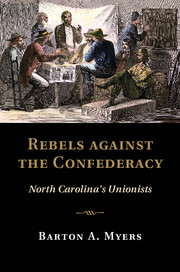'A well-researched, lucidly written, and convincing exploration of southern Unionism during the Civil War and Reconstruction. Highly recommended.'
Mark Grimsley - Ohio State University
'Barton Myers uncovers the clandestine networks, mortal risks, and stout hearts of North Carolinians who challenged Confederate authority and southern memory by siding with the Union. Connecting the social, political and military dimensions of loyalty with deep insight and empathy, Rebels against the Confederacy explains how diverse, loyal citizens endured daily trials and lifelong consequences for their actions. Civil War historians and enthusiasts alike will profit from this excellent book.'
Jason Phillips - West Virginia University
'A very valuable book. Barton Myers’s intelligent and sensitive treatment of Southern Unionists adds great clarity to a complex topic. His investigation of the nature and meaning of dissent is based on a creative and extensive reading of the evidence, judicious analysis, and admirably clear writing. He demonstrates the impact of Unionism on the course of the war in North Carolina and provides a model for careful analysis of opposition experience in wartime.'
Aaron Sheehan-Dean - Louisiana State University
'Myers’s fast-paced Rebels against the Confederacy rescues from oblivion the stories and lives of North Carolina’s Unionist resisters. Drawing heavily on the Southern Claims Commission case files, he charts their various forms of resistance, persecution by Confederates, and obliteration from historical memory by Lost Cause and later historians. Myers’s splendid study uncovers the shattered lives of those ‘rebels against a rebellion', uncovering a hitherto ignored chapter of Unionism embedded deeply within the Confederacy.'
John David Smith - University of North Carolina, Charlotte
'There is much to admire in Myers’s readable and nuanced case study that shows how, at least in North Carolina, unionist opposition to the Confederacy contributed to the nascent nation’s downfall. Relying on a combination of social, political, and military history, he describes the persecution of Unionists, the ways in which they resisted Confederate authority, and how they fared after the war.'
Daniel E. Sutherland - University of Arkansas
'Barton A. Myers adds significantly to the extensive scholarship on Confederate residents who opposed their states’ participation in the Civil War … readers will be … impressed by the fascinating stories Myers extracted from the many pages of testimony in each claim. The stories illuminate the suffering these North Carolinians experienced as well as their collective role in impeding the Confederacy … By tracing the lives of unconditional Unionists into the postwar South and revealing the 'violence, economic discrimination, and health struggles' these individuals encountered, Myers explains how their weakened and dispersed nature impeded their ability to tell their story. But even more critical was the desire in the region to expunge Southern history of its Unionist experience to maintain the myth of Confederate unity during the conflict. Myers deserves credit for his critical role in reversing this regional amnesia.'
Robert C. Kenzer
Source: The Journal of American History



